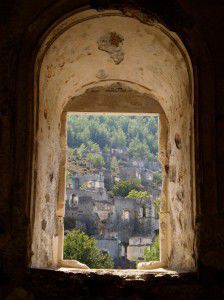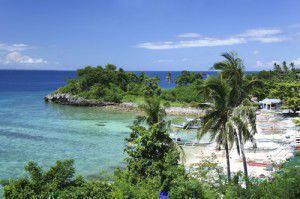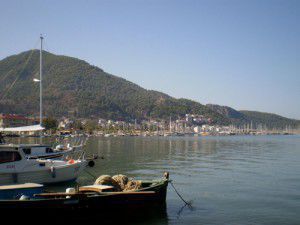Breaking down barriers with The Broke Backpacker
Meet Will. He’s the writer and adventurer behind travel blog The Broke Backpacker, and he just embarked on an epic two-year journey from home in the UK to Papua New Guinea.
The twist? He’s not taking any flights. Oh, and he’s travelling on a daily budget of $30.
Will’s been on the road already for two weeks, and is currently making his way through Europe. Over the next two years he’ll be visiting 30 countries, including Turkey, Pakistan, Myanmar, Tibet, and Indonesia, and sharing his adventures along the way.
Why are we telling you this?
Well. When we heard what he was planning, we figured Will might find himself in need of an app that includes over 120 languages from all across the world, which would enable him to talk to people wherever he goes.
Fortunately, it just so happens we have an app like that. So we’re very excited to announce that uTalk is the official language sponsor of Will’s adventure, and he’ll be using the app on the road to learn and speak everything from German to Tajiki, Albanian to Khmer. He’ll even be able to greet people in Tok Pisin on his arrival in PNG.
Will’s been travelling for seven years, and knows how important it is to speak a bit of the local language: “Learning a new language is hands down the best way to make new friends and peek behind the curtain. uTalk helps me to break down barriers, learn the local lingo and make friends in the most unexpected of places.”
We can’t wait to follow Will as he makes his way across the world, visiting some fascinating countries and meeting loads of interesting people. And we’re looking forward to hearing him speak all the languages 😉
You can follow Will’s adventures on Twitter or Facebook, or for more instant updates, on Snapchat (@wthatton).
10 of the world’s most amazing places
One of our top tips for learning a language is to take a holiday – it not only gives you a chance to practise your new language with the locals but you also get to visit somewhere nice. And why not take the opportunity to visit some of the world’s most amazing (if sometimes slightly bizarre) places while you’re at it?
1. San Alfonso del Mar
Like the world’s largest swimming pool, for instance, which is at San Alfonso del Mar in Chile. If you’re thinking of swimming lengths, you might want to stock up on energy drinks before diving in to this one. It’s more than 1,013 metres long, so paddlers should beware! It also has a 35-metre deep end – not for the unwary swimmer. The Guinness Book of Records named this pool as the biggest in the world, needing 66 million gallons of water to fill it up.
2. Mt HuaShan
Or maybe you’d like to visit a traditional Chinese tea house. What about this one, at the top of Mt. HuaShan? It’s 2,160 metres high and the path to get there is nothing short of terrifying. It’s thought that there may be as many as 100 fatal falls a year, and yet the trail is popular with tourists, keen to visit the teahouse, on the southern summit of the mountain, which used to be a Taoist temple, or the chess pavilion on the east peak.
3. Stewart Island
If bird-watching is your thing, you could visit Stewart Island in New Zealand. It’s one of the most remote destinations in the world, with only one town, Halfmoon Bay (also known as Oban) and an estimated population of just 450 people. The island is the only place to see the Kiwi bird in its natural habitat and is also home to five species of penguin.
4. Pink Lake
Next door in Australia, Pink Lake, just west of Esperance, is worth a visit. As its name would suggest, in certain weather conditions the water in the lake is pink, thanks to a particular kind of algae in the water. And this isn’t the only pink lake in the area. Lake Hillier, on Middle Island, is another example and an even brighter colour.
5. Joffre Lakes
However, if you prefer your lakes blue, the Canadian park of Joffre Lakes in British Columbia comes highly recommended. The lakes are a more traditional, but stunningly beautiful, turquoise blue and surrounded by peaks and glaciers. A trip to Joffre Lakes isn’t complete without an overnight stay, where you can camp under the stars and listen to the ice calving from the glacier.
6. Kizhi
The Russian island of Kizhi is found almost exactly at the centre of Lake Onega and boasts a spectacular wooden church, the Church of the Transfiguration, which was built in the 18th century without a single nail. Legend says that the lead builder used just one axe for the whole building, and then threw it in the lake when the church was completed, saying, ‘There was not and will not be another one to match it.’
7. Kayaköy
Just a few miles from the popular resort of Fethiye in southwestern Turkey, on the side of a mountain, is the village of Kayaköy. Greek-speaking Christians lived there until the 1920s but the village was abandoned follow a population exchange agreement between Turkey and Greece in 1923. Now a museum and historical monument, Kayaköy is a beautiful but rather eerie ghost town.
8. Capuchin monastery
Speaking of eerie, the Capuchin monastery in Sicily is home to 8,000 mummified corpses in the monastery catacombs. The bodies are all dressed in their best clothes and arranged in different rooms according to the type of person. The oldest in the collection dates from 1599, while the most recent addition is the body of Rosalia Lomabardo, who was embalmed in 1920 and is known as ‘Sleeping Beauty’.
9. ICEHOTEL
If you’re looking for somewhere a bit different to stay, you could try the ICEHOTEL in Jukkasjärvi, Sweden. Made with ice from the Torne River, the hotel offers ice and snow rooms, and runs a survival course every night for new guests on what to wear and how to cope when sleeping in temperatures below zero. But don’t worry – warm rooms are also available if you’re not a fan of the cold.
10. Malapascua
One extreme to the other – the island of Malapascua in the Phillippines boasts beautiful beaches and is most popular with divers, as it’s the only place in the world to see the pelagic thresher shark. There’s no transport on the island because it’s small enough to walk everywhere, and the only way to arrive on the island is by banca (a local boat ferry).
We hope that’s given you a few ideas for your next holiday. Don’t forget to learn a few words in the local language before you leave! And if we missed your favourite place, let us know in the comments…
Could you repeat that, please?
Today’s guest post is from Sian, a British ex-pat living in Turkey, who has some advice for anyone considering moving abroad.
Merhaba. Last year I made a life changing decision and decided that, at the age of 42, I wanted to leave the UK and move to Turkey. After much research, a lot of visits to the vets to ensure my two elderly cats could come, and a lot of packing and sorting out, the day finally came and on April 15th this year I moved lock, stock and barrel to Fethiye (you can follow my story on my blog, To Fethiye and Beyond).
Have I regretted it? Absolutely not. Would I advise other people to give it a try? Oh yes. Is it hot? Like you wouldn’t believe. Would I suggest that they learn some of the language before they came? Definitely. Unfortunately I didn’t follow my own advice and barely learnt more than 3 or 4 words before coming out here. Luckily for me, I armed myself with a EuroTalk Turkish DVD before I left so, yes, I do know a lot more Turkish now than when I arrived – although I still sometimes struggle with the simplest of words, the main one being teşekkürler, which means thanks – for some reason I keep thinking of it as ‘testicular’ which is not going to win me any friends (well, not the right sort anyway!).
Not only is the Turkish language very hard, what with its ‘i’ with a dot that is pronounced like ‘ee’, its ‘l’ without a dot (that isn’t an L) that is pronounced like a ‘u’, its ‘c’ that is pronounced like a ‘j’, while the ‘j’ is pronounced like an ‘s’ (seriously, who thought up this language!)… but the local people here also love to practise their English. You may start with every intention of saying something in the local language but as soon as they spot you they say hello, how are you and your brain just goes to mush and you respond in English.
Mind you, something must be sinking in as I did actually manage to have a conversation in Turkish just the other day. Admittedly it wasn’t the longest of conversations but we’ve all got to start somewhere, haven’t we?

I absolutely refuse to be a parody of a Brit abroad and spend the rest of my life speaking v-e-r-y s-l-o-w-l-y in English to the locals in a slightly patronising manner so I am going to keep on going with the EuroTalk DVD and hopefully by the end of the year I’ll be able to manage an even longer conversation!
And on that note I’ll say görüşürüz and wish you all a pleasant day.
Are you moving abroad? Let us know! We’d love to help you start learning the basics of your new country’s language.







